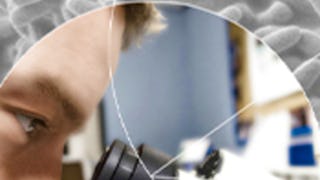Imagine if there were an organ in your body that weighed as much as your brain, that affected your health, your weight, and even your behavior. Wouldn’t you want to know more about it? There is such an organ — the collection of microbes in and on your body, your human microbiome.

Cultivate your career with expert-led programs, job-ready certificates, and 10,000 ways to grow. All for $25/month, billed annually. Save now


(1,206 reviews)
What you'll learn
Explain the concept of the human microbiome and its role in human health and functioning
Describe the relationship between microbial genomes and human history, lifestyle, and health
Details to know

Add to your LinkedIn profile
6 assignments
See how employees at top companies are mastering in-demand skills


Earn a career certificate
Add this credential to your LinkedIn profile, resume, or CV
Share it on social media and in your performance review

There are 6 modules in this course
Welcome Citizen Scientists! We're very pleased to have you join us on an exploration of the human microbiome. This is a fascinating area of study, and we hope you will find this six-module course worthwhile. Each module's content will be presented in similar fashion; our team will introduce topics by way of pre-recorded video lectures interspersed with guest interviews by subject matter experts. Module 1 will provide a broad overview about microbes and their diversity on earth and in the human body.
What's included
10 videos3 readings1 assignment1 peer review
In this module, we will dive into the fundamentals of how we study the human microbiome. We highlight recent advances in microbiome research methods and take you on a tour of the Knight lab. Please keep in mind, that Modules 2 and 3 are meant to provide a glimpse into our world of data generation and analysis. Modules 4, 5, and 6 will be less technical and provide a broad overview of fascinating research on the human microbiome. Stick with us!
What's included
9 videos2 readings1 assignment
This module highlights the basics of generating and analyzing microbiome data. We will also discuss how computational scientists are revolutionizing the development of tools for analyzing large, complex biological data sets and show you some of the cool ways that we visualize data! This module will help you understand data plots in later modules, but do not get discouraged if the material here is too technical, a full understanding is not required to complete the course!
What's included
7 videos2 readings1 assignment
Now that we've given you some background about the methods we use to analyze microbial data, it's time for us to talk more about recent discoveries in microbiome research. This module will focus on the main factors impacting the gut microbiota as well as the influence of the gut microbiota on nutrition and gut health. This is the fun part, so get excited!
What's included
8 videos1 reading1 assignment1 peer review
You're more than halfway through the course! We hope you've been learning lots of new, exciting things about the human gut microbiota! In this module, we'll shift the focus from nutrition and gut health to the rest of your body. How do your gut microbes and your immune system interact? What about your nervous system? Does the gut microbiota play a role in allergies and stress?
What's included
11 videos1 reading1 assignment
We will wrap up the course in this module by discussing what's in the American Gut. Rob will walk us through results from the American Gut Project and compare results from Jeff Leach and Michael Pollan. We will also hear from Michael Pollan on the importance of microbiome research and how it has changed the way he thinks about his health and what he eats.
What's included
8 videos4 readings1 assignment1 peer review
Instructors



Recommended if you're interested in Basic Science


University of Copenhagen


Imperial College London


Rice University


University of Virginia
Why people choose Coursera for their career




Learner reviews
1,206 reviews
- 5 stars
78.70%
- 4 stars
17.31%
- 3 stars
2.48%
- 2 stars
0.82%
- 1 star
0.66%
Showing 3 of 1206
Reviewed on Jan 4, 2021
loved this course! I am a nutrition and food science masters student and its a great introductory course for whoever is interested in nutrition and improving their health
Reviewed on Sep 2, 2021
Great course, very helpful in my work, very knowledgeable instructors and latest research on the impact of human gut microbiome on our overall health. Thank you to the creators of the course!
Reviewed on Feb 25, 2016
This is a very good course. The instructors are knowledgeable and very clear in their exposition. The materials are very good and there are many things worth learning within.
New to Basic Science? Start here.

Open new doors with Coursera Plus
Unlimited access to 10,000+ world-class courses, hands-on projects, and job-ready certificate programs - all included in your subscription
Advance your career with an online degree
Earn a degree from world-class universities - 100% online
Join over 3,400 global companies that choose Coursera for Business
Upskill your employees to excel in the digital economy
Frequently asked questions
Access to lectures and assignments depends on your type of enrollment. If you take a course in audit mode, you will be able to see most course materials for free. To access graded assignments and to earn a Certificate, you will need to purchase the Certificate experience, during or after your audit. If you don't see the audit option:
The course may not offer an audit option. You can try a Free Trial instead, or apply for Financial Aid.
The course may offer 'Full Course, No Certificate' instead. This option lets you see all course materials, submit required assessments, and get a final grade. This also means that you will not be able to purchase a Certificate experience.
When you purchase a Certificate you get access to all course materials, including graded assignments. Upon completing the course, your electronic Certificate will be added to your Accomplishments page - from there, you can print your Certificate or add it to your LinkedIn profile. If you only want to read and view the course content, you can audit the course for free.
You will be eligible for a full refund until two weeks after your payment date, or (for courses that have just launched) until two weeks after the first session of the course begins, whichever is later. You cannot receive a refund once you’ve earned a Course Certificate, even if you complete the course within the two-week refund period. See our full refund policy.
More questions
Financial aid available,




